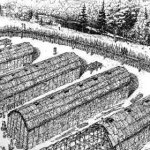mikemiller1955
Lieutenant General
- Joined
- Aug 3, 2008
- Messages
- 17,490
Does anybody know if there were Jesuit priests in the Abenaki town of St. Francis when Robert's Rangers attacked it that morning of October 4th?
I know the the priests had a history with St. Francis and converting Indians to Catholicism in Canada...but I can't find anything confirming they were present on the day of the attack or what their fate was.
and
I know they lived among the Abenakis in the village from time to time....but I can't find anything of their existence, presence or fortune on the day of the attack.
I guess what I'm really getting at....I wonder if John will make make a Jesuit priest figure?
Somewhat unrelated...but in research I found this interesting passage.
...in 1647, Massachusetts Bay banned Jesuit priests from the colony on penalty of death. The English Puritans who settled the colony feared the Jesuits for several reasons. First, simply because they were Catholic. To Puritans, Catholicism was nothing less than idolatrous blasphemy, and Catholics were destined for eternal ****ation. Second, because the Jesuits were French, and France and England were engaged in a bitter struggle for control of North America. Finally, Jesuit missionaries had converted large numbers of Indians in Canada to Catholicism. Indian converts were potential allies of France and enemies of the English. Although no Jesuit was executed for defying the ban, the legacy of anti-Catholicism in Massachusetts survived for generations.
The English Puritans who settled Massachusetts in the 1630s feared dangers lurking in the vast new land. What frightened them most was not hostile Indians or wild animals. In the woods to the north and west were people they perceived as "devils" — Roman Catholic Frenchmen and their Jesuit missionary priests.
The Puritans were horrified to find that Jesuit missionaries working in the French provinces were successfully converting Indians and, even worse, English captives to Catholicism. Puritans believed that Catholic converts were destined for eternal ****ation. To prevent the spread of Catholicism into Massachusetts Bay, the General Court banned Jesuit priests from entering the colony.
While the Puritans were inhospitable to anyone who did not share their religious views, they were particularly hostile to Roman Catholics. Puritans had originally separated from the Church of England because they believed it had not cleansed itself fully of "corrupt" Catholic practices. They "purified" worship by eliminating rites, rituals, and outward signs of religion such as crucifixes, holy water, statues, priestly vestments, and stained glass. They also rejected church hierarchy and abolished the priesthood. To them, the Pope was the "Antichrist," and the "Papists" who followed him were in league with the devil.
I know the the priests had a history with St. Francis and converting Indians to Catholicism in Canada...but I can't find anything confirming they were present on the day of the attack or what their fate was.
and
I know they lived among the Abenakis in the village from time to time....but I can't find anything of their existence, presence or fortune on the day of the attack.
I guess what I'm really getting at....I wonder if John will make make a Jesuit priest figure?
Somewhat unrelated...but in research I found this interesting passage.
...in 1647, Massachusetts Bay banned Jesuit priests from the colony on penalty of death. The English Puritans who settled the colony feared the Jesuits for several reasons. First, simply because they were Catholic. To Puritans, Catholicism was nothing less than idolatrous blasphemy, and Catholics were destined for eternal ****ation. Second, because the Jesuits were French, and France and England were engaged in a bitter struggle for control of North America. Finally, Jesuit missionaries had converted large numbers of Indians in Canada to Catholicism. Indian converts were potential allies of France and enemies of the English. Although no Jesuit was executed for defying the ban, the legacy of anti-Catholicism in Massachusetts survived for generations.
The English Puritans who settled Massachusetts in the 1630s feared dangers lurking in the vast new land. What frightened them most was not hostile Indians or wild animals. In the woods to the north and west were people they perceived as "devils" — Roman Catholic Frenchmen and their Jesuit missionary priests.
The Puritans were horrified to find that Jesuit missionaries working in the French provinces were successfully converting Indians and, even worse, English captives to Catholicism. Puritans believed that Catholic converts were destined for eternal ****ation. To prevent the spread of Catholicism into Massachusetts Bay, the General Court banned Jesuit priests from entering the colony.
While the Puritans were inhospitable to anyone who did not share their religious views, they were particularly hostile to Roman Catholics. Puritans had originally separated from the Church of England because they believed it had not cleansed itself fully of "corrupt" Catholic practices. They "purified" worship by eliminating rites, rituals, and outward signs of religion such as crucifixes, holy water, statues, priestly vestments, and stained glass. They also rejected church hierarchy and abolished the priesthood. To them, the Pope was the "Antichrist," and the "Papists" who followed him were in league with the devil.


